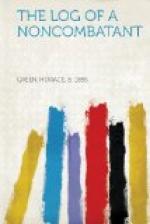While I was trying to limber up my German vocabulary he passed us along to his Ober-leutenant in the hut along the roadside. The Ober-Ieutenant was grave. He said we must report to army headquarters in Brussels, and that under no circumstances should we be allowed to return within the Belgian lines. In this way began our eight days’ confinement within the lines of the German Army of the North under General von Boehn.
Just as we had been warned repeatedly, so we discovered in reality that to cross between two opposing lines was no joking matter. Bad enough, particularly in the early days of the war, to a correspondent without permission at the front. To work up from the rear (if you had permission) was at least according to the rules of the game. But to cross between hostile armies—that was the one forbidden act. The fact that we were with an American Consul was not sufficient. Three days later Van Hee was allowed to return, but the remainder of the party, that is to say, Willard Luther and myself, were given a free trip into German territory and incidentally more than a week’s chance to study the German army from within.
Those next eight days Luther and I spent as willing and, on the whole, decently treated captives within the lines of the German Army of the North, talking freely with cultivated officers and grimy men of the ranks, and in this way learning much of the German war machine, the opinions of the officers and the men at their command. It would be interesting to tell how in Brussels we dodged from War Office to cafe, from cafe to consulate, from consulate back to War Office, and later were worried and watched and suspected; how we were shipped back across the German border on a combination Red Cross and ammunition train; how we were locked for much of the night in a half-mile tunnel of the northern Vosges Mountains, and there, in the groping darkness of our box-car prison, shared the soldier’s biscuit and his bottle, so coming to know the Kaiser’s private as a companion and not as the barbarian his enemies paint him.
The day after we got inside the German lines we went before Major Heinrich Bayer, at that time military commandant in Brussels in the absence of General von der Goltz. Jostling through the street and jamming the courtyard of the War Office was a crowd of a thousand persons—mothers, children, whole families begging for relief or permission to leave the city limits; German subjects trying to get passes, officials and employees of the civil administration taking orders from the military authorities. A relay of aides, orderlies, and secretaries led us from courtyard to corridor and from corridor to staff headquarters and into the Holy of Holies—the office of the commandant.
Grim, stern,—but courteous throughout the interview,—the major paced the floor beside his desk. He seemed anxious enough to be rid of the “crazy Americans” who had wandered through the Belgian and German lines, not altogether satisfied with their integrity, yet not wishing to take a hostile attitude. I asked him when he thought the war would be over. At the moment the German major, Vice-Consul Van Hee, and I were the only persons in the room.




